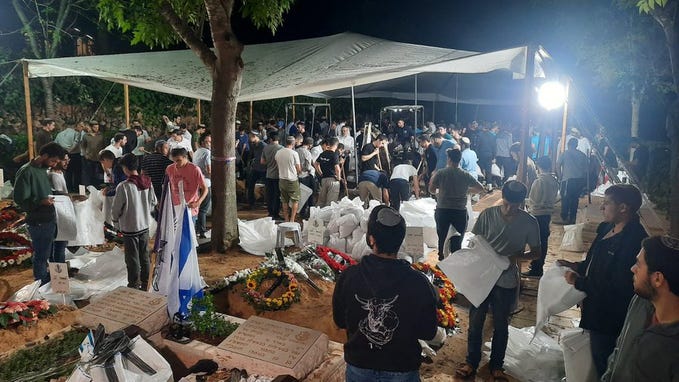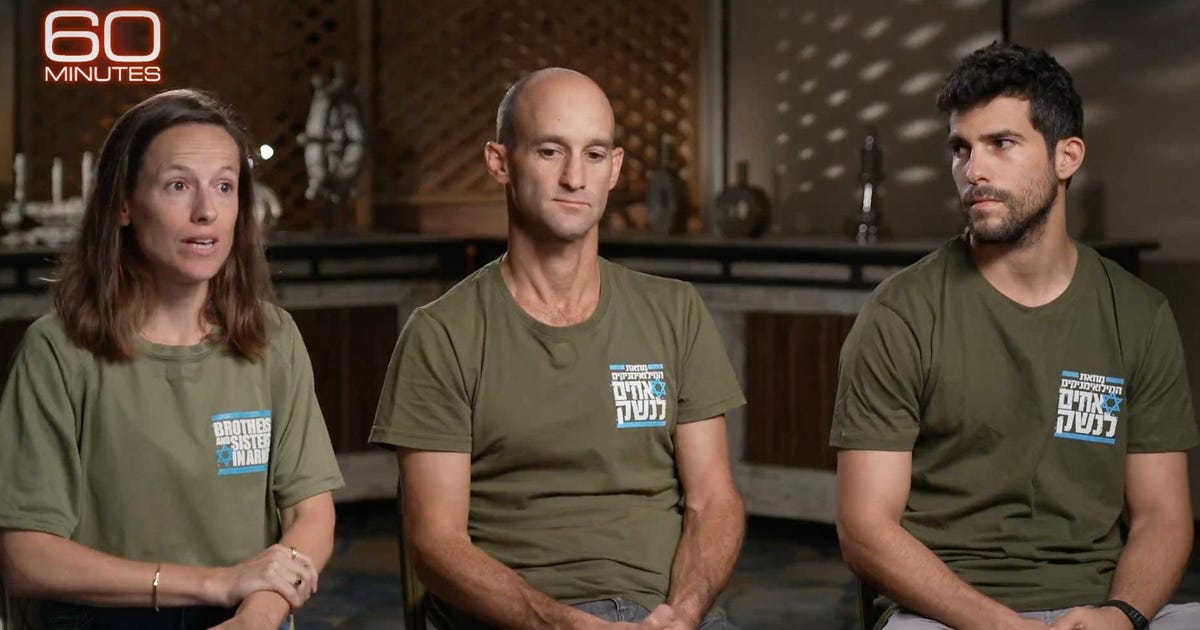Just back from another funeral, this one a bit up north, so it took most of the day. This will be brief.
And as for the video above, we’ll refer to it at the end.
The headline in the screenshot below reminded me of a conversation that I hadn’t thought about in ages. Many years ago, when our daughter and now son-in-law had just gotten engaged, we were seated around the Shabbat table. He was in the army at the time, fairly high up in the intelligence world. Something or other was going in Israel at the time, and I guess the conversation got a bit heavy. Someone must have said something about “if we survive.”
I don’t remember that comment, but I do remember our son-in-law’s response. They were recently engaged, so he was feeling a bit more comfortable saying what he thought (as in, it was too late to take my daughter back 😜). He listened, and then he said, nicely but clearly:
I actually don’t know what you’re talking about. This sounds like such a Diaspora conversation. What do you mean ‘If we survive’? No one who was not alive during the first days of the Yom Kippur War has ever lived a single moment when Israel’s survival was question.
Intifada? Blow up busses? Blow up restaurants? They can cause unimaginable suffering and grief, but they can’t put boots on the ground. And without boots on the ground, what can they do? You can’t defeat a country by blowing up its buses and cafes.
What made the impression on me, of course, was (a) the remark about a Diaspora mentality, which he rightly suggested we had not yet shed, and (b) the claim that Palestinian terror organizations were a horrible menace, but not an existential one.
Not anymore. See the headline below. Netanyahu, Gantz, Halevi (Chief of Staff), Gallant (Minister of Defense) are all saying it—we’re fighting for our lives.
Pogroms were a Diaspora thing? Now they’re not.
Palestinian terror groups were savages who couldn’t put real boots on the ground?
Now, that’s not true, either. And yes, we’re fighting to stay alive.
Today, we focus on the Home Front, what’s happening away from the battles, because that’s as much of the Israel story today, and it’s what’s being covered in the press much less.
BROTHERS IN ARMS … AGAIN
Remember the “Brothers in Arms”? They were the leaders of the protest movement until a week ago. There were many groups who were part of the movement; “Brothers in Arms” was the group of combat veterans (an enormous group, as you can imagine).
The screenshot from 60 Minutes is only so you’ll recognize their logo.
Now, the video below. At the height of the protest movement, it was a highly tech-led movement, with rapid communications capacity able to instruct protesters as to where to go, whom to protest, etc. They could get people to any intersection in the country in a matter of minutes. They hounded and hounded and largely brought the judicial reform mostly to a halt.
They were accused, of course, of not being patriots. They were accused of being spoiled lefties (by people who had never done a fraction of what they’ve done for the country, of course). They were accused of not being Zionists.
Well, the protests are obviously not happening. But the movement still has the ability to get people places. So, with the government unable to tend to all the families of the 150 or people now held in captivity, and the many more missing-probably-dead, the protest movement has used its reach to create command centers.
Below is one of the centers where a total of some 2000 volunteers are working to address each case, with each family. The audio of the video doesn’t matter (it’s about where to put the chairs). Note the logo on the shirt of the guy at the very end, running the show. Recognize it?
It was fine to disagree about judicial reform. Reasonable minds could and did differ.
What was not fine was to sit in the Diaspora, or even in Israel, and to label these people non-patriots. Or spoiled. Or sore election losers.
Those who wrote that would do well to apologize. Don’t hold your breath.
There are endless lines of people waiting to give blood (it’s a several hour wait, we were told today). There are funerals everywhere. What are we short of? Gravediggers, it turns out.
So what does the Bnai Akiva (religious) youth group have its young, high school aged kids do? They’re helping to dig graves. (Zoom in if you need to.)
Just like high school kids everywhere, right?

THE FACE OF RAW COURAGE
The Home Front was made of something different even during the pogrom, before the war.
This is Inbal Liberman. You can read her story below.
What you’re looking at is the face of raw courage.
She’s 25-years-old. She has been the security coordinator of Kibbutz Nir Am since December 2022. She heard explosions early Shabbat morning, according to Walla News, among other accounts.
The kibbutz is on the Gaza border, not far from Sderot, so she’s heard lots of sounds, and she knows what she knows. She realized that the sounds were different than those heard during the usual rocket attacks on the kibbutz — located near Sderot and a stone’s throw from the Gaza Strip.
So over the objections of the higher-ups, who told her she was over-reacting, she unlocked the arms storage, gave guns to the kibbutz’ kitat konnenut (volunteer security team) and took charge.
She placed her people in specific places around the kibbutz. When the terrorists arrived, this was the kibbutz that was ready. Over the course of a vicious gun battle that lasted hours, the Hebrew press reported, the armed civilians killed more than twenty-five attackers; Inbal, herself, killed five of them.
According to the post above, it was Nir Am, where a 25 year old woman took charge, that was the only kibbutz in the area without casualties.
If you’re just joining us, Israel from the Inside typically posts a written column on Mondays and a podcast on Wednesdays. That is obviously irrelevant for the time being.
We’ve delayed all the podcasts that were ready to go, because the people whose stories they tell deserve to tell them when we all have the bandwidth to hear. Hopefully, that will return some day.
In the interim, we’ll post as possible. Here in Israel, there are non-stop funerals to go to, shiva homes to visit, grandchildren to help care for while sons and daughters are in the army, so we’ll see.
Schedules are the least of our worries.
THE FUTURE OF POLITICS
After days of people accusing the government officials of not visiting hospitals, not visiting families, not being visible, they’ve started to respond. MK Idit Silman (of the Likud Party at present, but she’s hopped around, and she was the MK whose switched loyalties brought down the Lapid-Bennet government) decided to visit Asaf Harofeh Hospital, which is situated between the airport and the Gaza border.
As you can see above, the visit did not go very well.
Behind the massive volunteering efforts and a sense of national resilience you feel everywhere, there is seething rage. The incident at the hospital entrance is but one of many that are being shared on Israeli social media.
At the funeral I attended this morning, the family made a point of noting—more than once—that they had been told that a member of the coalition would be attending. They told the many hundreds of us assembled that they’d told whoever contacted them that under no circumstances would a member of coalition be permitted to attend, and if they did, s/he would be chased out. “They divided this country, they destroyed this country, and now their actions led to these young people’s deaths,” one speaker said.
I’ve been to many, many Israeli funerals over the years. And I’ve never, ever heard politics in eulogies before.
It’s a new era. And that sentiment is the sentiment of more than a few. Prepare for the political earthquake—though what it will look like, no one can possibly know.
Walking up the long dusty road at the kibbutz from the parking lot to the cemetery, which was a decent hike away, the uncontrolled sobbing of a young woman, being comforted by a group of female soldiers, pierced the air. It was heartrending. Everyone could hear it, and everyone wished they couldn’t.
I was walking with a friend, among a crowd of many hundreds, and realized, of course, that similar scenes were unfolding at dozens, if not hundreds, of other places in Israel today. How many funerals to you have a day if you need to bury 1200 people as quickly as possible (though many are not yet ID’s, so it will take time).
There was something different in the crowd today, and something different in the eulogies. (A very, very secular funeral.) Yes, people spoke about protecting the state. But they also spoke about the Jewish people. A lot.
We are burying 1200 people this week not because they were Israelis. We’re burying them because they were Jews.
The babies shot were butchered because they were Jews.
The Holocaust survivors killed were killed because they were Jews.
The grandmother who was shot at point blank range and was lying in a pool of her own blood—when a Hamas terrorist took her phone, video’ed the scene and uploaded it to HER Facebook page, which is how her grandchildren found out what had happened to her—wasn’t killed because she was Israeli.
Everyone here knows that they were killed because they were Jews. The soldiers are now dying because the attack was on Jews.
Somebody sent me this illustration, but I don’t know where he found it.
What Israelis—left and right, religious and secular, young and old, Jewish and Druze, immigrants and native—are saying to the “I’m counting on you” is
Don’t you worry. This time, the outcome is going to be very, very different.
Impossible Takes Longer is now available on Amazon and Barnes & Noble and at other booksellers.
Our Twitter feed is here; feel free to join there, too.
Our Threads feed is danielgordis. We’ll start to use it more shortly.












We're attending funerals not because we're Israelis. We're burying people because we're Jews.